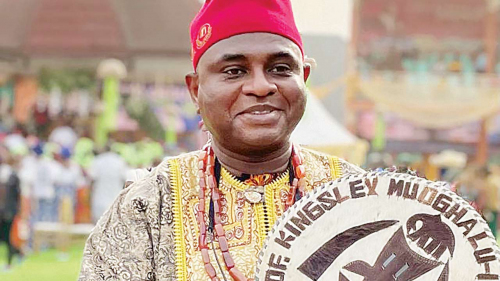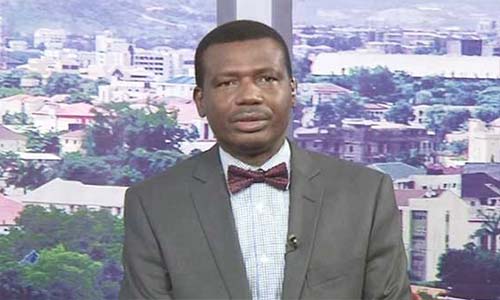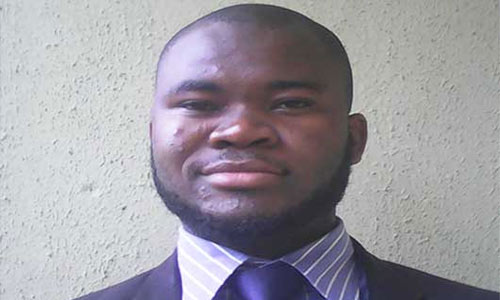Where’s the Vision?

By Kingsley Moghalu
Vision, the Oxford Dictionary tells us, is “the ability to think about and plan the future with imagination and wisdom”. Without visionary leaders, no country or organization can achieve at great levels. We must from now place greater emphasis on vision as a major criterion for leadership selection in Nigeria. Promises of bridges and roads, track records of paying workers’ salaries, all of which should be basic functions of governance, are a very low bar for leadership selection.
Vision is often associated with great transformations. It is important for a leader, political, organizational, or business to lay out a picture of a future that does not exist right now – and thus might appear “impossible”, “ambitious” or “impractical”. Next is to mobilize and motivate citizens, members, or employees to work collectively to attain such a future state. It is precisely this quality that drove the transformations achieved by great leaders and nations such as Mustafa Kemal Ataturk of Turkey, Sheikh Al Maktoum of Dubai, Abraham Lincoln of the United States, Mahathir bin Mohamad of Malaysia, and Ben Gurion of Israel.
Here at home, we had Rt. Hon. Dr. Nnamdi Azikiwe, the pan-Africanist and leading light of Nigeria’s struggle for independence, and his contemporaries such as Obafemi Awolowo and Sir Ahmadu Bello. Between these three leaders much was achieved in Nigeria’s regions in the 1950s and 60s. But a combination of the cold, calculated machinations of colonial Britain and the internal quest for ethnic dominance ultimately set Nigeria on a downward slope of internal conflict. Nigeria today needs a truly national and visionary leader that can set our country on the path of transformation.
We have had Vision 2010, Vision 2020, and the Economic Recovery and Growth Plan (ERGP).
But they all failed as a result of governance inadequacies, including a lack of dedication to execute the plans effectively. Just as important, these economic visions were not grounded on any economic philosophy or any philosophical worldview of the Nigerian state. This vacuum in turn exists because Nigeria is a territorial state but has not transitioned from a country to nation with a widely shared national ambition and sense of purpose. A transformational leadership can cure this nation-building deficit with the development and inculcation in citizens of a clear worldview.
A worldview is a way in which we see the world around us and our place in it. It is a personal or group perspective. A national vision is therefore often anchored on a worldview, which asks and answers questions such as: Who are we? Why is the world the way it is? Where have we come from? Where are we going and how will we get there? What are the values that will govern our society and pave our path to the future we want? What is our strategy to achieve success in a competitive world? What is the knowledge system that transmits and anchors our worldview?
The worldviews of all great nations are easily identifiable. That of the United States and much of the Western world is anchored on individual freedom, rational scientific inquiry, and an emphasis on strong, independent institutions to check tyrannical governance following the decline of monarchies in Europe (the “Old World”). Americans believe theirs is “God’s own country”, with a “manifest destiny” of greatness. The Chinese and Asian worldview is anchored on the cyclicality of time, social stability and order as an end in itself, and the superiority of community and its collective interest over individual rights.
Nigeria today is rudderless, with no particular direction in the world, and faces fundamental threats to its existence. Our citizens are increasingly unsure of what being a Nigerian means. Not surprisingly, we are fundamentally challenged in our quest for development. For Nigeria to make progress, therefore, we must become a “worldview state” for the following reasons.
First, without unity and a common sense of purpose, we cannot achieve much. When a country is not organized and motivated by a worldview, small views (extremely narrow worldviews) reign. Ethnic and religious irredentism and corruption are prime examples of these narrow worldviews. We have increasingly retreated into our primordial cocoons of nativity as opposed to identifying with modern statehood, and even the sense of country, let alone achieving nationhood, increasingly feels like the past tense. This sense was captured by Chinua Achebe’s controversial last book There Was a Country, which reflected a strong sense of disappointment, bitterness even, at what our country has become.
This is why creating, promoting, and internalizing a national philosophical worldview is a powerful way to solve the problems of ethnic and religious divisions in Nigeria. This task belongs to our leadership cadre. We need something that unites us, which rises above and subordinates our differences. We are in fact too absorbed with these differences and with Lord Lugard and his wife Flora Shaw. With very few exceptions such as Japan and the two Koreas, most countries in the world are made up of different ethnic groups. Thus, insisting on a quest for ethnic purity as the basis for nationhood means that Nigeria will have to become perhaps 250 countries.
Our diversity, coming from an artificial amalgamation of different ethnic groups in 1914 by colonial Britain, is doubtless a challenge because nations grow organically based on mutual trust. A 2002 paper by Alberto Alesina et al of the Harvard Institute of Economic Research, titled “Fractionalization”, established empirical evidence of a link between heightened ethnic diversity in countries and internal conflict, low GDP per capita, and weak democratic evolution. African countries are the world’s most diverse relative to other continents.
The challenge to development that Nigeria faces by reason of its ethnic and religious diversity is therefore real and should not be underestimated. But it can be successfully managed if we have good leadership that creates a level-playing field with justice and equity. It can be turned into a source of strength just as it has been in the United States. A constitutional restructuring of Nigeria back to real federalism remains the best way to achieve this outcome. It is the best path to development in a populous, diverse country.
Second, Nigeria needs a worldview to help us achieve our full potential. It’s time we moved from potential greatness, while 100 million Nigerians live in extreme poverty, to actual greatness that makes their poverty history. Driven by a strong worldview, China has lifted 800 million out of poverty in the past 40 years. Without a competent state anchored on knowledge, vision, positive passion and innovation, this achievement would not have been possible.
A worldview will not only motivate us but will also equip us with the tools to shape and meet our national goals. It is the only thing that can drive progress that is genuine, one that we can measure and sustain. This is because value systems that define a society, and a knowledge system that will equip Nigerians to acquire, interrogate, and validate knowledge as well as a strategy to attain collective goals, are all part of any coherent worldview.
Third, having a worldview remains essential for Nigeria to attain developed country status, or at least full emerging-market status from our present lower-middle-income country and a “frontier” market one. A strong and clear worldview will give us a national ambition to assess from a comparative and competitive standpoint the distance (“transformation gap”) between us and more successful countries. We can and should, therefore, aim to catch up with and possibly overtake countries such as Thailand, Indonesia, and Malaysia that in the early 1960s had less economic or technological prospects than Nigeria, but today are middle-income countries and strong emerging markets.
Fourth, our statecraft – our global diplomacy, economic management, and security and intelligence services – must be driven by a worldview if it is actually to advance the real national interest of 200 million Nigerians rather than those of vested foreign interests.
Fifth, and finally, a clear, well-articulated and internalized worldview will enable us as a country have real knowledge (an understanding of “the causes of things”) of the phenomenon of globalization. With such knowledge, we can become more productive and competitive in the global economy. We will become part of the production value chain of globalization, and not merely consumers of, and a market for, the goods of globalization as we are today.
Nnamdi Azikiwe and his fellow nationalists had a worldview geared toward political freedom from colonial domination. They achieved success based on that philosophical vision. The Murtala Muhammed/Olusegun Obasanjo military administration in the 1970s, as well as the Ibrahim Babangida administration in the mid-1980s/early 90s achieved very significant successes in the field of foreign policy. From the independence of Angola and Zimbabwe in which Nigeria played pivotal roles, to the Technical Aid Corps and peace keeping in troubled states in West Africa, Nigeria projected regional power and its national interest effectively.
It is hardly so today. Why? Because a focus on political freedom and diplomatic influence that is not backed up by domestic economic transformation is not sustainable. Moreover, Nigeria’s political leadership culture became progressively anti-intellectual. Our leaders thus became increasingly ineffective, and incompetent from the absence of knowledge. By the way, knowledge also is a value and is not always the same thing as having a certificate. Development begins in the mind. Ideas rule the world. We love the “practical” and jest at “blowing grammar”. But look around the world: every “practical” success is based on a sound concept, and many successful nations are led by men and women “blowing grammar”. We can elect to be different, but we will live with the consequences.
Moghalu, a former deputy governor of the Central Bank of Nigeria, is the president of the Institute for Governance and Economic Transformation, a public policy think tank. This article is adapted from the 2022 Convocation Lecture he delivered recently at Babcock University.



